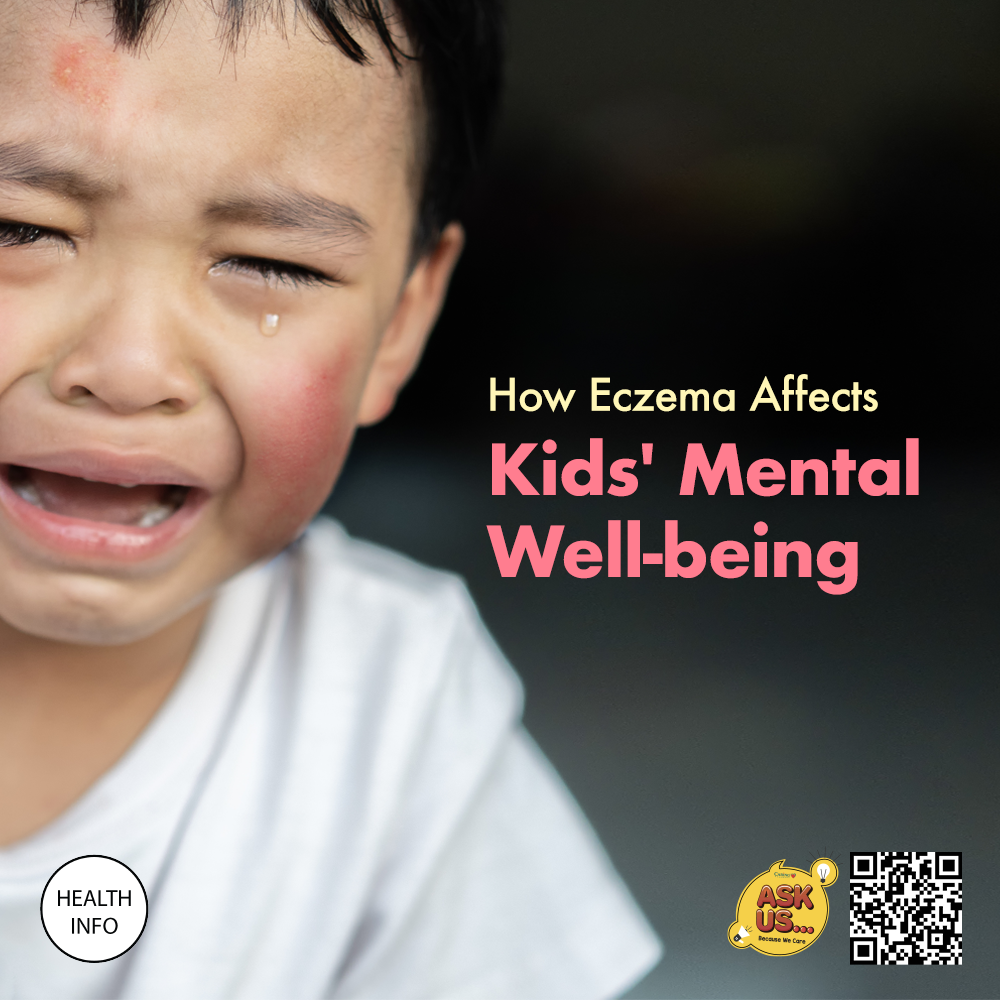- Home
- Health Center
- Health Info
- Mental Health and Kids With Eczema: Understanding and Support
Mental Health
Mental Health and Kids With Eczema: Understanding and Support


Do you know that eczema is more than just a skin rash?
Eczema, or atopic dermatitis, is a chronic skin condition that causes red, dry, itchy, and inflamed skin, often affecting children but can occur at any age. While its physical symptoms are well-known, eczema can also impact a child’s emotional health, leading to stress and frustration. Recognizing both the physical and mental effects of eczema is key to offering proper care and support to affected children.¹⸴²⸴³
Physical Impact of Eczema:¹⸴²⸴³
- Skin Symptoms: It causes itching, redness, dryness, and inflammation. In severe cases, it can lead to oozing, crusting, and thickened skin.
- Increased Risk of Infections: Constant scratching can damage the skin barrier, making children more vulnerable to infections.
- Disturbed Sleep & Daily Activities: The discomfort can disrupt sleep, leading to fatigue and difficulty concentrating, which affects daily activities like school and sports.
Mental impact of Eczema: ⁴⸴⁵⸴⁶
- Emotional Distress: Persistent itching and flare-ups can lead to irritability, frustration, and emotional fatigue.
- Social Challenges: Visible symptoms can affect self-confidence and social interactions, sometimes leading to isolation or bullying.
- Anxiety and Depression: Children may constantly worry about flare-ups, treatment effectiveness, or how others perceive them.
Supporting the Mental Health of Children with Eczema
Here are some tips for parents to help support the mental health of children with eczema:⁴⸴⁶
- Provide Education: Teach children about eczema, including triggers and management strategies. Involving them in their care, such as applying moisturizers and avoiding triggers, can help them feel more in control and less anxious.
- Create a Supportive Environment: Encourage children to talk about their feelings and experiences with eczema. Let them know it’s okay to feel frustrated, and remind them that eczema does not define who they are. Communicate with teachers or daycare providers about their condition to ensure proper support.
- Ensure Adequate Sleep: Establish a consistent bedtime routine, such as reading or listening to calming music, to help children get enough rest. Keeping the bedroom cool and choosing soft, breathable bedding can also reduce skin irritation.³
- Encourage a Healthy Lifestyle: A balanced diet supports both overall and skin health. Drinking plenty of water helps moisturize dry skin. Physical activity can boost mood, reduce stress, and improve sleep.
- Practice Relaxation: Introduce simple relaxation techniques like deep breathing, listening to calming music, or engaging in creative activities like drawing. These can help reduce stress and calm the mind.
- Provide Psychological Support: Be on the lookout for signs of anxiety, depression, or withdrawal. If needed, seek help from a mental health professional. Support groups and health campaigns can also help children feel less isolated.
Conclusion
Eczema is more than just a skin condition—it also impacts a child’s mental and emotional well-being. Addressing both the physical and emotional challenges of eczema is essential for providing comprehensive care, helping children live happier, more fulfilling lives despite the challenges of eczema.
References:
- Children and eczema. National eczema society. (Web accessed August 2024). Web link: https://eczema.org/information-and-advice/information-for-parents-and-children/children-and-eczema/
- Atopic Dermatitis (eczema). Mayo Clinic. (Web accessed August 2024). Web link: https://www.mayoclinic.org/diseases-conditions/atopic-dermatitis-eczema/symptoms-causes/syc-20353273
- Why People with Eczema Have Trouble Sleeping (and What to Do About It). National Eczema Association. Web accessed August 2024). Web link: https://nationaleczema.org/blog/eczema-leads-to-problems-sleeping/
- Mental Health and Eczema – Seeing the Unseen. National Eczema Association. (Web accessed August 2024). Web link:https://nationaleczema.org/blog/mental-health-science/
- Psychological effects of atopic dermatitis. DermNet. (Web accessed August 2024). Web link: https://dermnetnz.org/topics/psychological-effects-of-atopic-dermatitis#:~:text=Children%20with%20atopic%20dermatitis%20are%20prone%20to%20teasing%20and%20bullying,and%20feelings%20of%20social%20stigmatisation.
Latest Health Info
Brave the Cold: Winter Travel Needs
Winter travel has its kind of magic — snow-covered landscapes, cozy lodges, hot drinks, and festive markets. But traveling in ...
Beat the Heat When Travelling
Whether you’re on a scenic beach vacation or exploring a busy city, hot weather can quickly wear you out and ...
Got Pins & Needles? Learning about Diabetic Neuropathy
Diabetic neuropathy is a common yet serious complication of diabetes, estimated to affect up to 50% of people with the ...



